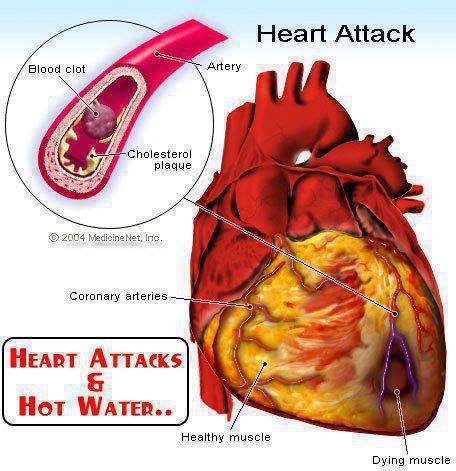HEART ATTACKS & HOT WATER:
A very good article which takes two minutes to read. Heart Attacks And Drinking Warm Water
This is a very good article. Not only about the warm water after your meal, but about Heart Attacks. The Chinese and Japanese drink hot tea with their meals, not cold water, maybe it is time we adopt their drinking habit while eating.
For those who like to drink cold water, this article is applicable to you. It is nice to have a cup of cold drink after a meal. However, the cold water will solidify the oily stuff that you have just consumed. It will slow down the digestion. Once this 'sludge' reacts with the acid, it will break down and be absorbed by the intestine faster than the solid food. It will line the intestine. Very soon, this will turn into fats and lead to cancer. It is best to drink hot soup or warm water after a meal.
Common Symptoms Of Heart Attack...
A serious note about heart attacks - You! should know that not every heart attack symptom is going to be the left arm hurting . Be aware of intense pain in the jaw line.
You may never have the first chest pain during the course of a heart attack. Nausea and intense sweating are also common symptoms. 60% of people who have a heart attack while they are asleep do not wake up. Pain in the jaw can wake you from a sound sleep. Let's be careful and be aware. The more we know, the better chance we could survive..
A cardiologist says if everyone who reads this post shares it to 10 people, you can be sure that we'll save at least one life. Read this & Send to a friend. It could save a life... So, please be a true friend and share this article to all your friends you care about..
A very good article which takes two minutes to read. Heart Attacks And Drinking Warm Water
This is a very good article. Not only about the warm water after your meal, but about Heart Attacks. The Chinese and Japanese drink hot tea with their meals, not cold water, maybe it is time we adopt their drinking habit while eating.
For those who like to drink cold water, this article is applicable to you. It is nice to have a cup of cold drink after a meal. However, the cold water will solidify the oily stuff that you have just consumed. It will slow down the digestion. Once this 'sludge' reacts with the acid, it will break down and be absorbed by the intestine faster than the solid food. It will line the intestine. Very soon, this will turn into fats and lead to cancer. It is best to drink hot soup or warm water after a meal.
Common Symptoms Of Heart Attack...
A serious note about heart attacks - You! should know that not every heart attack symptom is going to be the left arm hurting . Be aware of intense pain in the jaw line.
You may never have the first chest pain during the course of a heart attack. Nausea and intense sweating are also common symptoms. 60% of people who have a heart attack while they are asleep do not wake up. Pain in the jaw can wake you from a sound sleep. Let's be careful and be aware. The more we know, the better chance we could survive..
A cardiologist says if everyone who reads this post shares it to 10 people, you can be sure that we'll save at least one life. Read this & Send to a friend. It could save a life... So, please be a true friend and share this article to all your friends you care about..

